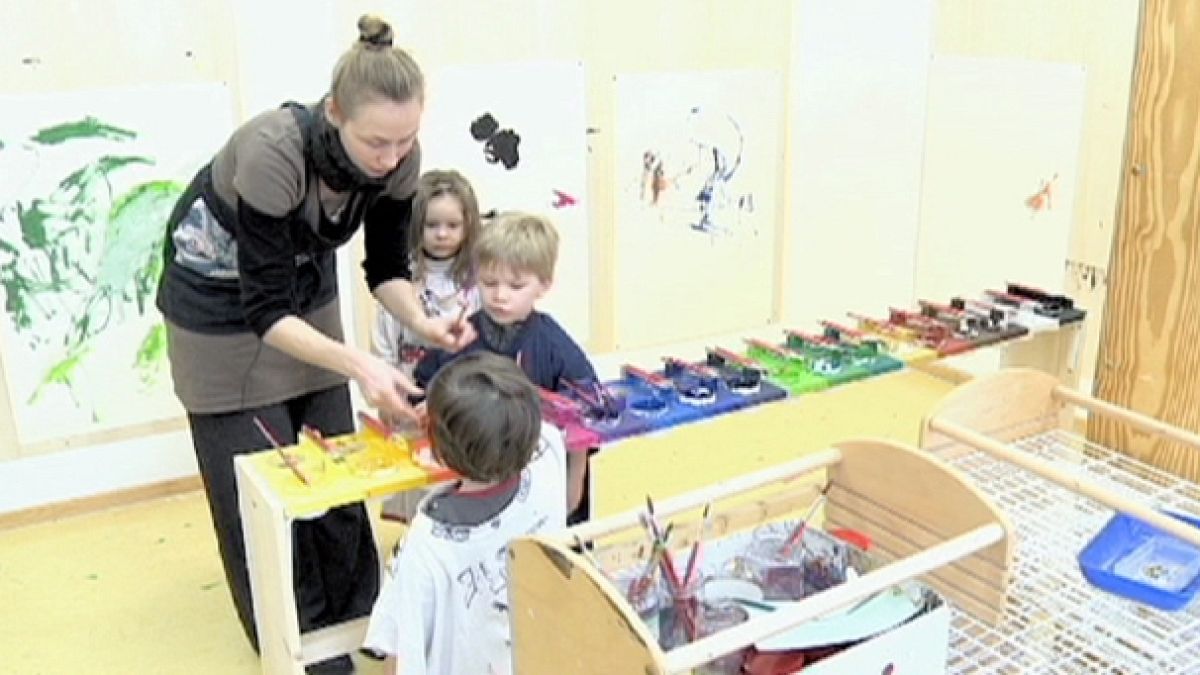The first years of a child’s life are when the brain does most growing. So early education is crucial, and can lay the foundations of personal and social development. In Germany, as in many countries, nurseries are seen as much more than just playtime for kids. Some combine fun and games with learning techniques to encourage infants to learn autonomously. Wiesengrün nursery is a good example.
The approach at the nursery is that you are never too young to do scientific experiments. Using food colouring, paper, water and sugar children get a first introduction to physics. But it is no effort – the kids learn through play.
It is the basis of the Montessori method: respecting the child’s natural instinct to learn and develop. The teacher just supervises and provides materials like brushes and paint.
Art teacher Bianca Mögel explains: “When you paint a picture you get deeply involved with it, and here nobody will come and say it is right or wrong, or you have to improve it. Children have their own space, there is no judgement or pressure to perform. So when children say, ‘Look at the picture I painted, isn’t it nice?’ I reply, ‘Is it really?’ So they answer, ‘Yes it is!’ In doing this they confirm their own assessment and that contrasts with what happens in other nurseries, schools and workplaces. This applies to adults as well as children.”
Caryl Karima Franz-Ibrahim, the director of the Familien Zentrum Kita Wiesengrün, said: “I think that in the past people thought that in order to learn, children have to be taught to do something. Today we know that this learning process happens internally. All we do is provide materials so that they can develop their knowledge. We use the Montessori teaching methods, based on the idea that given the right framework, children will learn by themselves.”
Interaction between parents and babies has been shown to have a big impact on the development of a child’s cognitive skills. In Istanbul, Turkey the Mother-Child Education Foundation teaches mums key ways to encourage their children’s learning processes.
In Turkey only half of all pre-schoolers go to nursery school. We spoke to Sevda Özcan whose son Batu does not go because his parents cannot afford it. So he will start school next year when he is seven. Sevda knows this late school start could be a handicap, so she teaches her son at home using materials supplied by the Mother-Child Education Foundation.
She said: “At least I can prepare my son for school, physically and psychologically. He has learned how to hold a pencil, and he knows how to listen to me. Before, when I read him stories, he didn’t listen, he drifted off into his own world, but now he knows how to concentrate and how to listen.”
Once a week, Sevda goes to a group session with one of the Foundation’s trainers who helps them understand their children’s development, discussing things like day to day discipline. Sometimes it is almost like group therapy and the parents get as much out of it as their children do.
The Foundation targets pre-schoolers because research shows that pre-school education is vital for a successful school career.
Ayla Göksel, the Foundation’s director, said: “Children who have been exposed to early teaching are more likely to go to university, to complete more years of schooling. They get higher status jobs and join the modern economy, they are more likely to have computers, and be IT literate.”
The programme has been so successful that it is spreading and similar ones are being set up in other European and Middle East countries.
“In rural and poor parts of India children under the age of five often do not get pre-school education. The NGO-run Balwadis Project aims to tackle the problem, helping underprivileged kids take their first steps in education. We visited one ‘Balwadi’ in Tamil Nadur state.
Venkatesh, the project manager of Aid India: “At Aid India we think education is one of the most key issue that we address and Balwadi is one of the stepping stones to the first grade and so on henceforth, thus it plays a very important role in education of youngsters from three to five years of age and I think it’s one of the best solutions that we can offer to the challenges that India has.”
The main aim of these nursery schools is to make contact with children and motivate them to attend school regularly later on. They learn basic skills like counting and the alphabet.
One teacher, Lavanya, said: “We use flash cards to teach the children and we give them a notebook for their exercises. You can see the different skills that we teach, such as the Tamil alphabet, the English alphabet, counting from one to 10. We test the children for every skill. When they learn something we put a mark on the chart and we help them learn more.”
Illiterate children in India are easily exploited as cheap child labour. But the children who have been through the programme will go onto primary school and hopefully even all the way to a good education and a bright future.


